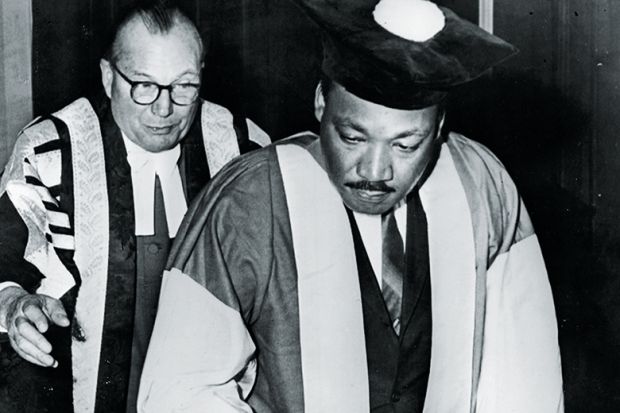The words of Martin Luther King continue to inspire millions across the world almost 50 years after his death – with activists from the #TakeAKnee, #MeToo and gun control movements seeking to follow his example of non-violent protest.
The legacy of the US civil rights leader is now informing a more unlikely cause in the UK: concern over the growing managerialism of university human resources departments.
Thanks to a research fellowship from a local charitable trust, a Newcastle University scholar is to explore how Dr King’s teachings could shed light on the rift between university administrators and academics caused by the introduction of performance targets.
Nick Megoran, reader in political geography at Newcastle, began to look at the issue after campaigning against the introduction of the proposed “Raising the Bar” initiative at Newcastle in 2015. The policy was widely criticised as imposing “draconian” targets for grant funding on staff, although this was denied by the university, which withdrew the policy after consultation.
Dr Megoran, who has been awarded a grant by the William Leech Trust for his research, believes that Dr King’s “theological critique of institutional power honed within African American theologies of liberation” could help managers to create more sympathetic HR policies in which “staff can feel valued and work meaningfully in an organisation”.
Dr King’s belief that all people are created “imago Dei” or “in the image of God” and must therefore be treated respectfully was often missing from universities’ workforce strategies, said Dr Megoran, an honorary chaplain at Newcastle.
“Dr King’s warning that if we ‘thingify’ people then we risk mistreating them remains highly apposite for universities at a time when academics are formally described as ‘resources’ in an institution’s inventory,” said Dr Megoran.
His project, titled “‘Image of God’ or ‘human resource’?”, will also draw upon the speech given by Dr King at Newcastle University in April 1967, on his last international visit before his assassination a year later.
That visit is important to understanding the politics of Dr King, whose outspoken political views extended beyond civil rights in the US, said Dr Megoran.
“There is a danger that Martin Luther King becomes a cardboard cut-out of a civil rights leader frozen in time in Washington 1963 during his ‘I have a dream’ speech,” he explained.
Dr Megoran insisted that he was “not trying to draw an equivalence” between the 1960s civil rights movement and alleged mistreatment of staff within UK universities.
However, the preacher would have recognised how university staff often felt “mistreated, bullied and reduced to outputs...[because of a] reduction in their humanity”, he said.
Dr King’s work could “problematise” current thinking about unhelpful HR practices and language that had been ingrained within institutions. “It is only since the 1980s that the language of ‘human resources’ has arisen, but we have now grown used to it, as well as the way staff are sometimes crassly treated,” Dr Megoran said.
Register to continue
Why register?
- Registration is free and only takes a moment
- Once registered, you can read 3 articles a month
- Sign up for our newsletter
Subscribe
Or subscribe for unlimited access to:
- Unlimited access to news, views, insights & reviews
- Digital editions
- Digital access to THE’s university and college rankings analysis
Already registered or a current subscriber? Login










